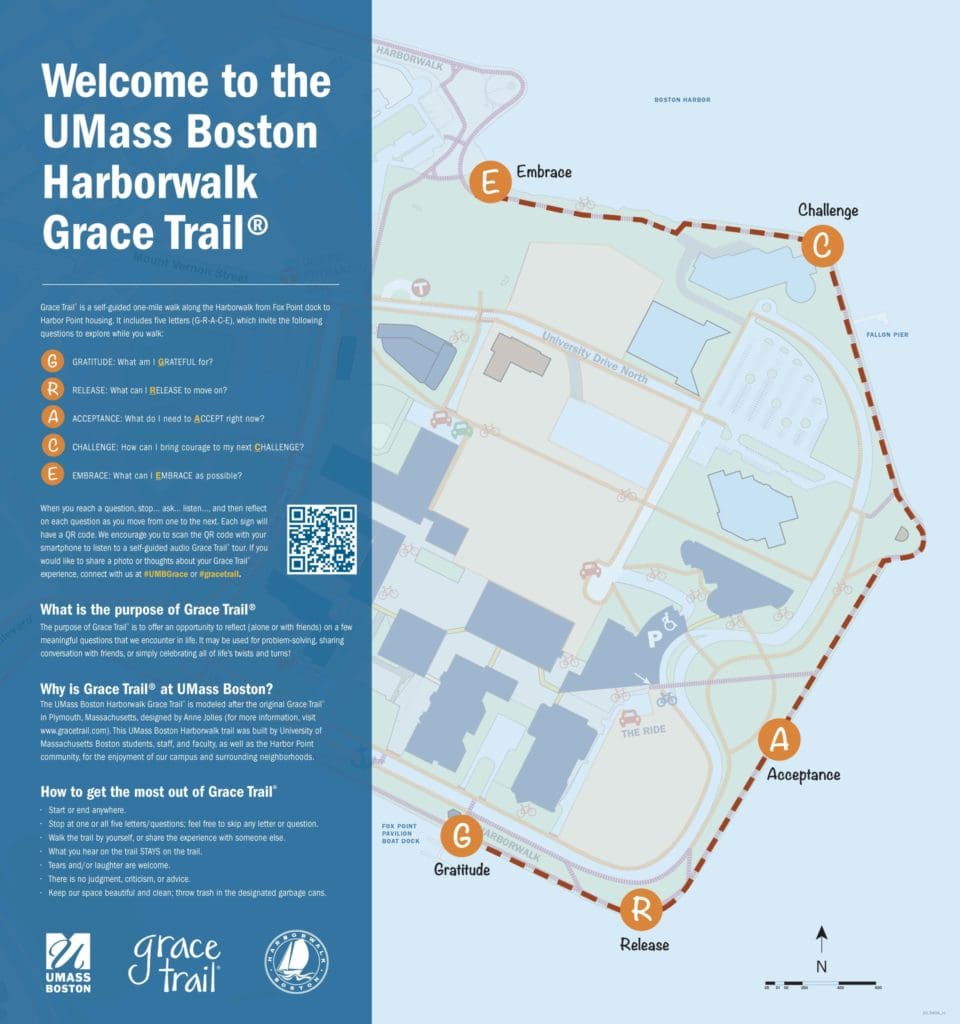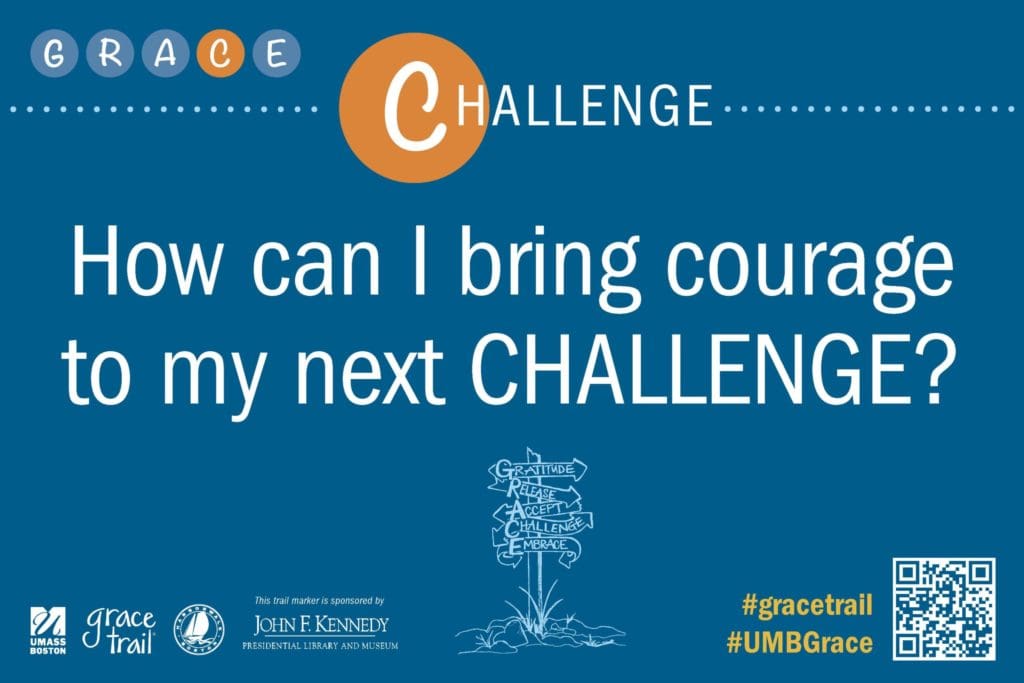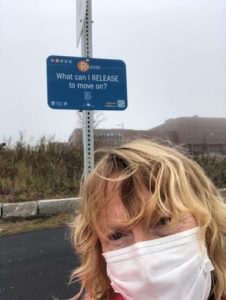This is a guest blog written by Sarah Camhi and Linda Chiofar, with the College of Nursing and Health Sciences at the University of Massachusetts Boston. They were the recipients of our 2020 Community Change Grant Program.
Our University and Local Community Needs
University students have high levels of stress and anxiety. Our most recent data from the University of Massachusetts, Boston (UMB) shows that 31% of our students report high levels of stress. Stress is linked with issues relating to concentration and memory which can have negative impacts on academic success. Providing an outlet for relieving stress, while also engaging in physical activity, could improve the physical and emotional well-being of our 16,000+ students and extend to our 2,500+ faculty and staff.
Surrounding the UMB campus is the Harborwalk, a 47-mile public walkway that includes parks, public art, and education that celebrated its 36th anniversary in fall 2020. A section of the Harborwalk that encircles the UMB campus was renovated in 2018.
Immediately adjacent to UMB and within the Harborwalk is the Harbor Point neighborhood, a diverse population of people living in an urban mix of residential, commercial, tourist and educational facilities, including K-12 schools, public and private housing, a community health center, a youth center, and 3 museums. Therefore, creating a walking trail to enhance and provide a physical activity opportunity for residents and workers in the Harbor Point neighborhood is a way that UMB can connect, give back and enhance our local community’s health and wellness.
Our America Walks Community Change Grant Project

In January 2020, we received a Community Change Grant from America Walks to create and install a UMB Grace trail (Gratitude, Release, Acceptance, Challenges and Embrace). This contemplative process offers a stress reducing, health promoting opportunity for individuals to complete a mindful walk while reflecting on ways to enhance their well-being.
The trail includes maps, information about this process, reflective questions and small rock cairns with words strategically placed to encourage personal growth and healing. The trail was planned to be installed along a 1-mile segment of the Harborwalk on the UMB campus.
Our Community-Engaged Approach
When we started the project, we knew the project would be complex since the trail we mapped out around our university campus on the Harborwalk had multiple owners (Commonwealth of Massachusetts, John F. Kennedy Presidential Library), was maintained by multiple entities (University of Massachusetts, Boston, Friends of the Boston Harborwalk, Boston Harbor Now, Massachusetts Department of Recreation), and was managed by yet another group (Boston Planning and Development Agency). We also wanted to honor the original message of the Grace trail, created by Anne Jolles, who was a local Massachusetts resident from Plymouth.
Finally, we wanted to create a trail that not only our diverse community of UMB students, faculty and staff could identify with, but also one that would be useful to the surrounding community residents who utilize the Harborwalk. Therefore, in order to make the project successful, we utilized a community-engaged approach to bring together multiple agencies, companies, and people that had a vested interest in the Harborwalk land and its use to create our trail.

The process of creating and installing the trail with our community took nearly a year and included hundreds of hours of volunteer staff, student and faculty time, including the coordination of multiple local, state and federal agencies. The success of this project is due to the energy, enthusiasm and excitement our partners had for this project, as well as the countless volunteer hours. We had true collaborators from each agency, people were willing to lend their time, skills, expertise, and feedback to make this happen.

[clear]The design of the signs was led by our UMB creative team (Rose Coveney) with input from Anne Jolles, the original Grace trail creator. Additional input for our signs was from guidelines set forth by the Boston Planning and Development Agency, Boston Harbor Now, Friends of Boston Harbor, the Department of Conservation and Recreation, and the John F. Kennedy Presidential Library. We also had feedback from UMB Facilities, Space and Leadership, and Office of Research from the College of Nursing and Health Sciences, as well as UMB students.

At each stage of the process, we allowed people to comment and suggest changes which took 6+ months of time. The signs were printed on donated materials and installed by UMB’s Linda Chiofar and Chris Sweeney in October 2020.
A few items are in the process of being completed for the trail including adding: 1) Audio files to make the trail signage not only accessible to the visually impaired but also add a guided walking component that can be accessed via a QR code, 2) Instagram page for people to post and share their pictures and experiences #UMBGrace, and 3) UMB webpage to share the maps, content and audio files which is linked with our University Health Services.
COVID Impact
The COVID pandemic did prevent us from installing and opening the trail as intended, which was planned to be a public ceremonial launch with a guided walking tour. However, after discussions with our community partners, it was clear that we should install the trail for the local residents and community to enjoy during this difficult time. Now more than ever, we need to improve both our physical and mental health with a restorative and reflective activity.
Future Plans
When it is safe for us to re-open campus and welcome back our campus community, we do hope to add personalized rock cairns designed by students, staff, faculty and community members. We are also in the process of adding additional signage to our campus to direct traffic to the trails.
Finally, once campus activities resume, we hope to add in an evaluation of 1) trail use post installation to compare to pre-installation 2) stress and physical activity levels before and after using the trail.
It Takes a Village!
As you can see, this project took the input and contributions of many people to make it successful! We are stronger together. We would like to take a moment to recognize the many individuals and organizations that were involved in this project:
University of Massachusetts Boston
- College of Nursing and Health Sciences
- Nursing Department: Linda Chiofar
- Kinesiology Department: Sarah Camhi
- Graduate Student: Catarina Ambrizzi-Moraes
- Office of Research: Jessica Whiteley, Meghan Jackman and D Kuehnel
Grace Trail:
- Anne Jolles
JFK Presidential Library:
- Norm Beland
- Alan Price
- Ian Shephard
Friends of the Boston HarborWalk:
- Liz Nelson Weaver
Department of Conservation and Recreation (DCR) Boston Harbor Now:
- Alice Brown
- Mike Manning
Boston Planning and Development Agency:
- Chris Busch
